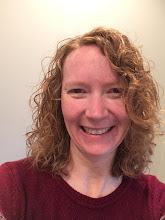There are a lot of different ideas out there about how much we "should" be working on our writing. I heard advice once from Clint Johnson that the key is consistency. Even if you can only find 15 minutes every day to write, write for those 15 minutes. That philosophy has been very freeing for me.
I have found that if I try to focus in on 15 minutes a day, often I end up writing a lot longer than that. Once I get started, somehow I find more time. But I also have to be flexible. I started getting in a habit of waking up early to write - and I am definitely not a morning person. I would wake up about an hour before my son woke up, and that was my writing time. It worked great for a couple of months. Then I got pregnant again and exhaustion set in. I could not wake up early anymore; in fact, I was doing well if I could get up with my son. And on top of it, at about the same time, my son learned to get out of his crib and experimented with no naps and waking up earlier.
So much for a habit.
But I didn't give up. And I think that is the key. I tried a lot of different times and ways of writing until I am doing something now that works a little bit better for me. I will admit that I am not perfectly consistent, but I am able to write at least regularly. That's better than what I could say a couple of months ago (just check out my blog posts in Nov-Dec).
And I've found out something else significant. There is a lot of great advice out there about how much to write each day, but ultimately you have to find what works for you. I've found that when I am just writing, I can sit down and go for hours at a time. Revision is a different animal entirely, however.
Especially when I am trying to make cuts, I've found I can only work for a half-hour or less. After that, I start listening to my story instead of reading the words. Everything sounds just great and nothing could be eliminated. At least until I go back the next day and start over a little before I ended the day before. Then I find all kinds of things that I could get rid of.
So write as much as you want or as little as you need. Do whatever works for you. Listen to the advice out there long enough to try it out and figure out what is your style. Then ignore everything else and just write. And most of all, don't beat yourself up if things don't always go according to plan. Life never does. Just keep writing.
I have found that if I try to focus in on 15 minutes a day, often I end up writing a lot longer than that. Once I get started, somehow I find more time. But I also have to be flexible. I started getting in a habit of waking up early to write - and I am definitely not a morning person. I would wake up about an hour before my son woke up, and that was my writing time. It worked great for a couple of months. Then I got pregnant again and exhaustion set in. I could not wake up early anymore; in fact, I was doing well if I could get up with my son. And on top of it, at about the same time, my son learned to get out of his crib and experimented with no naps and waking up earlier.
So much for a habit.
But I didn't give up. And I think that is the key. I tried a lot of different times and ways of writing until I am doing something now that works a little bit better for me. I will admit that I am not perfectly consistent, but I am able to write at least regularly. That's better than what I could say a couple of months ago (just check out my blog posts in Nov-Dec).
And I've found out something else significant. There is a lot of great advice out there about how much to write each day, but ultimately you have to find what works for you. I've found that when I am just writing, I can sit down and go for hours at a time. Revision is a different animal entirely, however.
Especially when I am trying to make cuts, I've found I can only work for a half-hour or less. After that, I start listening to my story instead of reading the words. Everything sounds just great and nothing could be eliminated. At least until I go back the next day and start over a little before I ended the day before. Then I find all kinds of things that I could get rid of.
So write as much as you want or as little as you need. Do whatever works for you. Listen to the advice out there long enough to try it out and figure out what is your style. Then ignore everything else and just write. And most of all, don't beat yourself up if things don't always go according to plan. Life never does. Just keep writing.

I agree. I used to write late at night, but now usually write in the morning.
ReplyDelete